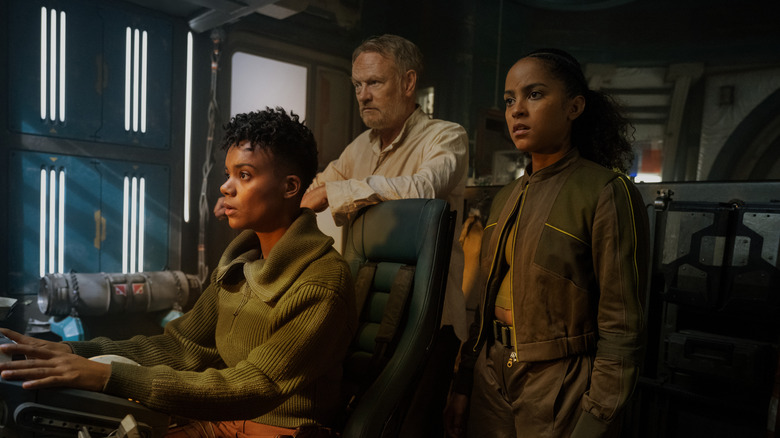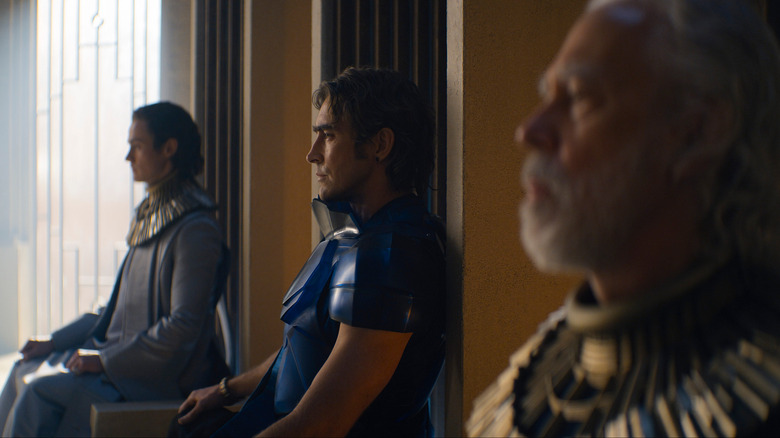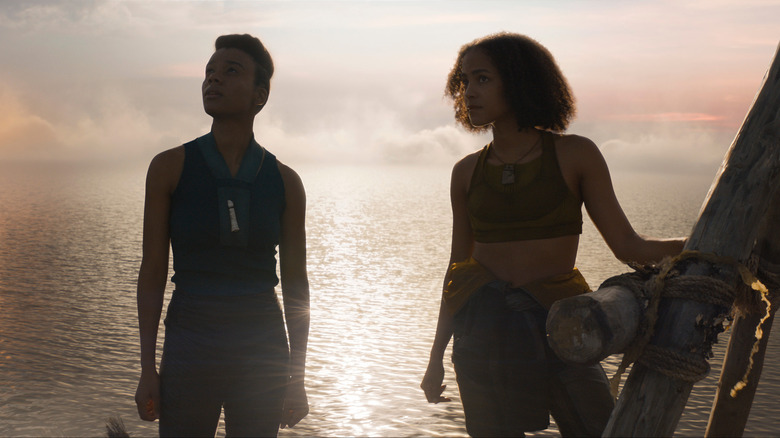Foundation Season 2 Review: Unexpected Heart In A Dense Sci-Fi Adaptation
- The Cleon brothers continue to fascinate
- More engaging approach to its storytelling, vastly improved from first season
- May be too unwieldy for casual viewers
- Still prone to slow moments that make the narrative drag
At first glance (and second, and third, for that matter), Isaac Asimov's "Foundation" might not seem like the easiest book to adapt for television. Dense, unwieldy, and ambitious, it's hard science fiction that sprawls across multiple timelines and planets, threatening to leave the uninitiated in the dust. The first season of "Foundation" suffers from the fact that it has to spend so much time just getting us up to speed, making it somewhat dry and inaccessible. But the second season happily remedies this issue: With all the exposition and world-building out of the way, it's free to really delve into the heart of the narrative. From Lee Pace's much-discussed nude swordfight in the very first episode, "Foundation" transforms itself into a more engaging, action-packed series that might just win over viewers who were left unimpressed by the first season.
When last we saw our favorite mathematical genius, Gaal Dornick (Lou Llobell), she had awoken on her home planet after over 100 years in cryosleep, only for her long-lost daughter Salvor Hardin (Leah Harvey) to show up as well. The two get down to the business of reconnecting, trying to get their ship off the planet, and working with an echo of Hari Seldon (Jared Harris) to keep the Foundation project on track. Meanwhile back on Trantor, the Empire's grip is slipping on the planets in their control, and Brothers Dusk (Terrence Mann), Day (Lee Pace), and Dawn (Cassian Bilton) struggle to maintain the appearance of full synchronicity after the tampering with Cleon's DNA generations earlier left them slightly less than identical copies of one another. Day makes the monumental decision to end the Cleonic dynasty, choosing to marry Queen Sareth (Ella-Rae Smith) of Cloud Dominion and begin his own biological legacy by fathering children rather than passing the throne down to Brother Dawn, as Cleons had been doing for some 600 years. But when war is foretold between the Empire and the Foundation, the two factions are set on a collision course that will have grave consequences for all.
The trio of Cleons
The triad of the Empire continues to be one of the most fascinating elements of the show. Mann, Pace, and Bilton are constantly impressive in their ability to lend different character notes to each iteration of Dusk, Day, and Dawn — they manage to feel cohesive enough as a unit, but there is also a marked difference between the three different Cleons (technically four, including the rebel that was briefly featured in the first season) that we've seen over the course of the show, and that's entirely a testament to the strength of their performances. The devolution of their bond with one another works in tandem with the power of the Empire crumbling, and in this season, they create the sense of being on entirely different paths with entirely different personalities. Previous generations of Cleons took no effort to be identical, while this version of Day has to have a movement instructor to remind him to eat in unison with his brothers, and Dusk and Day happily pursue their own interests.
The second season of "Foundation" also benefits from a wide array of new characters who we are quickly able to connect with emotionally. From the clerics Brother Constant (Isabella Laughland) and Poly Verisof (Kulvinder Ghir) — the Foundation is in its religious era now, and they've been spreading the good word of Hari Seldon around the Outer Reach planets — to the lovable rogue Hober Mallow (Dimitri Leonidas) to Ben Daniels' idealistic yet pragmatic General Bel Riose, there's finally a well-developed universe of interesting characters. Whereas Season 1 of "Foundation" felt a little cold and remote because so many of the main figures were either emotionally repressed clones or extremely logical scientists, there's a warmth to the expansion of "Foundation" we see here. Even our mathematicians have a little spring in their step — Harris in particular is given the freedom to humanize Hari Seldon in new and interesting ways, whether through a flashback to his time spent with the love of his life or his growing bond with Gaal and Salvor.
Slow moments and dense narratives
Still, "Foundation" isn't perfect. It has a frustrating tendency to throw in little set pieces, like Gaal and Salvor trying to get their ship started, that drag on and bring the rest of the narrative to a complete standstill. Although this season has much better pacing in general, there's no escaping the fact that it has a pretty complicated narrative, one that might always be a turn-off for casual viewers who may not have the patience for it.
Despite these minor quibbles, the second season of "Foundation" is impressive for its ability to course-correct away from some of the issues that plagued its first, taking what could have been an impenetrable science-fiction text and giving it life. With impressive performances from its main cast and a willingness to take itself a little less seriously, "Foundation" is a show that's just beginning to hit its stride.
"Foundation" Season 2 premieres on Apple TV+ on July 14.


